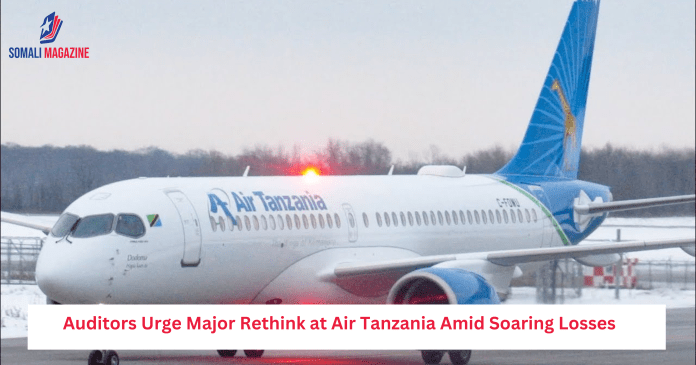Facebook Twitter (X) Instagram Somali Magazine - People's Magazine
Despite heavy government support, the airline’s continued losses, grounded jets, and costly decisions spark calls for a new operational strategy.
Auditors reviewing Air Tanzania’s finances have raised serious concerns after the airline posted another year of major losses. They’re now advising the airline to work closely with the government to study the best way forward, including whether to keep using the Airbus A220 aircraft.
For the 2023–2024 financial year, Air Tanzania recorded a net loss of TSh91.8 billion (about $34 million). This is over 60% more than the previous year’s losses. The national audit office revealed this in a report presented to the government in March. According to the report, the airline has been losing money every year for the past six years.
Even with large government support — including TSh70 billion for staff salaries and TSh57 billion for development — the airline has struggled. In total, Air Tanzania’s accumulated losses have now reached more than TSh530 billion.
The audit office says the main reasons behind the financial troubles are the high costs of leasing and maintaining new aircraft, which has put a big strain on the company’s finances.
One of the biggest issues has been with the airline’s Airbus A220-300 aircraft. These planes had to be grounded for long periods due to engine problems and a shortage of spare parts. The four affected aircraft were grounded for between 279 and 721 days — that’s nearly two years in some cases — by the end of June 2023.
These problems came from issues with the engines, which are made by Pratt & Whitney. During the time the planes couldn’t fly, the airline still had to pay fixed costs totaling nearly TSh9.2 billion. Although the government provided about TSh5.5 billion in support to help cover the lease costs, it wasn’t enough to offset the full financial damage.
The audit found that these problems could have been avoided. They said there was a lack of proper research before buying the planes, and poor understanding of the purchase contracts. Because of this, the airline missed opportunities to make warranty claims on the faulty engines — which could have saved them money.
The audit office stated that the company has taken on financial burdens that could have been avoided.
On top of the A220 issues, the airline has had other fleet-related problems. For example, delays in getting permits and slots have held back the launch of cargo (freight) operations.
There’s also a big problem with a De Havilland Dash 8-300 aircraft. This plane has been grounded for over seven years — and four of those years were spent trying to fix it, without success. The airline spent a huge TSh20.6 billion trying to maintain and refurbish the aircraft, but it still wasn’t working as of June 2024.
The audit report blamed this on difficulty getting spare parts and poor decision-making. It said the airline’s management didn’t properly assess whether it was financially wise to try and repair the old plane before spending money on it.
Auditors are urging Air Tanzania and the government to carry out a serious review of the airline’s operations. They suggest studying whether the current aircraft types — especially the A220s — are still the right choice, considering all the costs and issues faced so far.
With years of ongoing losses, high spending on aircraft that aren’t flying, and problems with spare parts and planning, the future of Air Tanzania may depend on making smarter, more informed decisions going forward.

